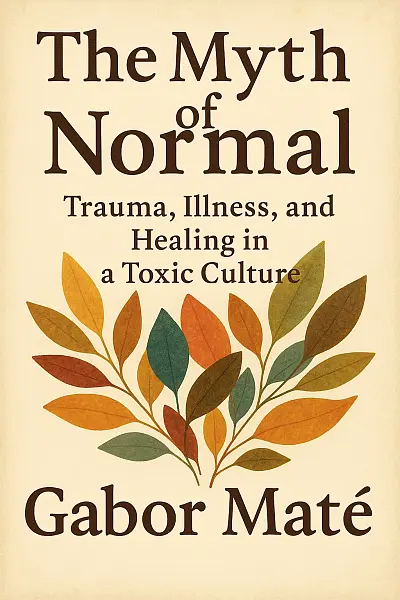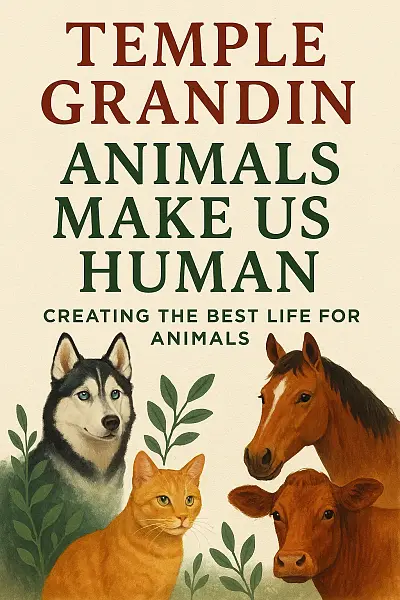
The Myth of Normal: Trauma, Illness, and Healing in a Toxic Culture
by: Gabor Maté
Gabor Maté, a compassionate physician, explores modern Western society where illness and distress seem more commonplace than ever. He’s deeply motivated to understand why “normal” life leaves so many people unwell, questioning everything we accept about health.
When he recognizes a crucial disconnect—how prevailing medical models overlook trauma and the relentless stress of daily life—Maté feels compelled to challenge the status quo. He urges us to confront how culture itself can be toxic, pushing us to reimagine health from the inside out.
Blending science, stories, and reflection, Maté’s style is eye-opening yet warmly accessible. Will society listen before it’s too late?
""In a world that worships conformity, our suffering speaks not of our flaws, but of a culture estranged from its own humanity.""
Let's Break This Down
The Author's Voice
Atmosphere
Expect a contemplative, compassionate mood that feels both intimate and probing. The tone is empathetic but unsparing, inviting you into a space where personal stories and societal critique intertwine. While there's a undertone of urgency, the atmosphere encourages deep reflection, offering both comfort and provocation as Maté explores the hidden consequences of modern life.
Prose Style
Maté's writing is clear, personable, and highly accessible—even when unpacking complex ideas. He moves fluidly between anecdotal narrative and scientific explanation, using direct, conversational language that draws you in. The prose is unpretentious, peppered with evocative metaphors and pointed questions, making even challenging topics feel approachable and human. Footnotes and references are present but never intrusive, keeping the focus on the main thread.
Pacing
The rhythm is steady and deliberate, encouraging you to absorb and ponder rather than rush through. Maté alternates between gripping case studies, broader cultural analysis, and reflective pauses, which keeps the pages turning without sacrificing nuance. Some chapters unfold more slowly, offering dense insight that may require breaks to process—but the narrative flow remains inviting and consistent.
Voice & Perspective
Maté writes with the authority of a seasoned physician and the warmth of a compassionate observer. He seamlessly blends memoir, clinical experience, and cultural criticism, grounding arguments in personal stories. The voice is engagingly direct, sometimes confessional, and always inquisitive—never preachy, but constantly challenging assumptions. Readers get the sense of a guide who’s walking alongside, not lecturing from above.
Imagery & Detail
Vivid, empathetic portraits of patients and families serve as entry points to broader social critique. Descriptions are sensory and immediate when recounting lived experiences, while analytical passages lean more on clarity than ornament. Expect memorable snapshots that linger: the tension in a waiting room, the subtle cues of distress, the small kindnesses and failures of our everyday environments.
Overall Feel
The book feels like an illuminating conversation with a trusted friend—one who’s unafraid to name uncomfortable truths but remains rooted in hope. There's a strong undercurrent of advocacy, but it’s balanced by openness and curiosity. Readers can expect to feel both seen and gently challenged, prompted to rethink not only how we define “normal,” but how we relate to ourselves and each other.
Key Moments
- Childhood scars as the hidden blueprint for adult health struggles
- Sharp takedowns of what society labels "normal"—brace for serious paradigm shifts
- Gut-wrenching patient stories that make trauma heartbreakingly tangible
- Mic-drop moment: “The question is not why the addiction, but why the pain?”
- Father-son reflections—Maté’s personal journey woven into medical analysis
- Page-turning mix of neuroscience and social critique with zero sugarcoating
- A radical call: Healing isn’t just personal, it’s cultural—are you ready to rethink everything?
Plot Summary
The Myth of Normal isn’t your typical “story,” but Gabor Maté leads us through a compelling exploration of illness, trauma, and healing, structured almost like a detective journey into the human condition. Early on, he establishes his central argument: what we often call “normal” in our modern Western society is actually deeply unhealthy. Through a blend of personal anecdotes, case studies from his work as a physician, and thorough scientific research, Maté highlights how trauma—especially childhood adversity—manifests as both mental and physical illness later in life. Major plot points include deconstructing myths around addiction and mental health, unraveling how societal pressures warp childhood development, and presenting a path toward authentic healing rooted in compassion, self-awareness, and radical acceptance. The book’s climax arrives with Maté’s call to redefine what health and “normality” mean, followed by a resolution in which he outlines practical steps for both individuals and broader society to move towards true well-being.
Character Analysis
While The Myth of Normal is nonfiction, Maté himself serves as the principal “character,” sharing his evolution from a traditional doctor to a radical critic of Western medical models—motivated by his own traumas and parenting struggles. The book also showcases a mosaic of real patients and family members: for example, the mother with autoimmune disorders whose story Maté uses to illustrate the bodily imprint of suppressed emotion, or the numerous individuals struggling with addiction whose journeys embody the costs of collective denial. Over the course of the book, these vignettes reflect how people’s coping mechanisms, once adaptive, can become destructive when misunderstood by themselves or society, and how insight, connection, and empathy spark genuine change.
Major Themes
One huge theme is that “normal” is a myth—the so-called healthy baseline of our culture is itself traumatizing, particularly in its insistence on productivity, competition, and emotional suppression. Maté explores how trauma doesn't just mean obvious abuse, but any event or environment that wounds a person’s sense of self or connection. Another key idea: mind and body aren’t separate, so psychological suffering manifests as physical illness and vice versa, a concept he demonstrates with powerful patient stories. Finally, Maté delivers a message of hope: healing is always possible, especially through compassion (towards ourselves & others), open dialogue about pain, and creating nurturing environments.
Literary Techniques & Style
Maté’s writing blends scientific rigor with vivid storytelling, which makes dense concepts engaging and digestible. He uses metaphor masterfully—comparing trauma to an invisible injury that shapes a person’s posture long after the wound itself—and blends memoir with investigative reportage to keep readers emotionally invested. Symbolism crops up in his repeated references to “toxic culture” as both a literal and figurative poison. The book’s structure is episodic: we’re taken through themes chapter by chapter, with case studies anchoring each concept, and the prose is accessible yet deeply empathetic, always inviting the reader to reflect on their own experiences.
Historical/Cultural Context
Set in the context of 21st-century Western society, the book responds directly to rising rates of mental and physical illness, loneliness, and burnout, especially in North America. Maté draws on recent advances in neuroscience and trauma theory, but he also links his observations to broader cultural forces: consumer capitalism, the medicalization of distress, and the marginalization of vulnerable groups. Personal stories (including Maté’s survival of the Holocaust as an infant) and sociopolitical analysis enrich the text’s cultural resonance.
Critical Significance & Impact
The Myth of Normal has gained widespread attention for its accessible critique of mainstream healthcare and its argument that many modern ailments are rooted in “normal” societal dysfunction. Critics and readers have praised its blend of scientific insight and deep compassion, though some point to a tendency toward repetition or a lack of concrete solutions for systemic issues. Still, Maté’s work has sparked important conversations around trauma, illness, and the potential for healing within families, communities, and society at large, cementing its place as a modern classic in popular psychology and social criticism.

Unmasking modern trauma in a society that redefines “normal”
What Readers Are Saying
Right for You If
If you’ve ever been drawn to psychology, self-help, or books that peel back the layers of how society affects us, you’ll probably get a ton out of The Myth of Normal. This one’s especially for you if you love big-picture thinking about health, culture, and emotional healing. Think of it as a must-read for fans of Brené Brown, Johann Hari, or Glennon Doyle—if those “aha!” moments in their books make you nod along, Gabor Maté’s deep dives might hit just as hard.
It’s really great for:
- People who geek out over mental health or trauma research—Maté’s background gives it loads of credibility and insight.
- Readers who like questioning the status quo—if you don’t mind being challenged to rethink “normal” in society, this book delivers.
- Anyone in the helping professions (therapists, social workers, teachers, even healthcare folks) who wants to understand trauma, stress, and illness on a broader level.
- Nonfiction lovers who want their reads deeply reflective and a bit philosophical, rather than packed with quick “how-to” tips.
But, fair warning—this isn’t everyone’s cup of tea:
- If you prefer stories with a plot or need fast-paced, easy-to-digest advice, this might feel a bit dense or heavy.
- The writing dives deep into research and big ideas, so if you’re not up for intense reflection on society and personal history, it may be tough going.
- Readers who dislike books that lean critical of mainstream medicine or societal structures might feel frustrated.
Overall, if you love books that challenge how you see the world (and yourself), and aren’t afraid of a hefty, thought-provoking read, give this a shot. But if you just want something breezy or strictly practical, you might want to save it for another time.
What You're Getting Into
Ever wondered why so many of us feel unwell in what’s supposed to be a "normal" world?
In The Myth of Normal, Dr. Gabor Maté dives deep into the hidden connections between our culture, trauma, and chronic illness, challenging what society labels as healthy.
Blend in personal stories, medical insight, and compassionate advice, and you’ve got a guide that’s both eye-opening and hopeful—perfect for anyone curious about why we hurt, and how true healing might just mean rethinking everything we’ve been told is “normal.”
Characters You'll Meet
-
Gabor Maté: Central narrator and clinician who weaves personal history with decades of medical experience. Unpacks how trauma shapes health, serving as guide and commentator throughout.
-
Daniel Maté: Gabor’s son and co-author, offering candid reflections and intergenerational dialogue. Acts as a bridge, questioning assumptions and amplifying diverse perspectives.
-
Gabor’s Patients: A composite group whose real-life stories and struggles with illness and trauma illustrate the book’s arguments. Their experiences ground the theory in lived reality, making abstract concepts tangible.
-
Gabor’s Family: Used as case studies to highlight how trauma and learned behaviors pass through generations. Their inclusion personalizes broader societal critiques and invites empathy.
More Like This
If you found yourself absorbed by Bessel van der Kolk’s The Body Keeps the Score, you’ll immediately notice how The Myth of Normal expands that crucial conversation around trauma and healing. Both authors peel back the layers of how our bodies internalize pain, but Maté turns the lens outward, wrestling with societal roots and the culture that fosters illness. There’s a shared compassion here, but Maté dives deeper into the systems shaping individual suffering, so if you’re drawn to books that bridge personal experience with broader critique, this is right up your alley.
Another natural companion is Lost Connections by Johann Hari, which challenges convention around mental health and cites social disconnect as a major cause. While Hari focuses on depression and the loss of meaning, Maté stretches the diagnosis wider, tying everyday stress, autoimmune illness, and chronic pain back to a toxic cultural design rather than individual failings. If Hari’s search for meaning through connection resonated, expect Maté’s emphasis on belonging, authenticity, and holistic healing to strike a similar, illuminating chord.
In terms of screen storytelling, Maté’s themes echo the introspective explorations found in the TV series This Is Us. Much like the show, which skillfully links intergenerational trauma to how characters navigate love, loss, and identity, The Myth of Normal emphasizes how our histories—and the unspoken wounds of families—reverberate through our choices and health. If you appreciate stories that weave together past and present with empathy and psychological insight, Maté’s work will feel right at home in your reading stack.
Critic's Corner
What if everything we think we know about “normal” health is not just misleading, but actively harmful? That’s the bracing premise behind The Myth of Normal, where Gabor Maté turns a piercing gaze on modern society’s hidden wounds. He challenges readers to imagine a culture—and a healthcare system—where true well-being isn’t the exception, but the expectation. The book asks, When dysfunction becomes the status quo, can we even recognize illness for what it is?
Maté’s writing style embodies compassion and accessibility, fusing narrative fluency with genuine authority. He draws you in, blending memoir with vivid case studies, and balances complex science with relatable, story-driven portraits. The prose is unhurried yet urgent, never flashy—Maté lets the gravity of his observations do the heavy lifting. There’s a conversational warmth, aided by well-chosen anecdotes and a knack for distilling neuroscience or epidemiology into language that feels both fresh and comprehensible. The book’s structure is ambitious: threads of social critique, personal testimony, and medical insight weave together, sometimes meandering but more often enhancing the immersive effect. At its best, Maté’s voice strikes a rare harmony between doctorly precision and the lived sincerity of someone who has walked alongside suffering—yours, mine, and his own.
Thematically, The Myth of Normal swings for the fences. Maté argues that Western culture itself is a major predisposing factor in illness—one that conventional medicine almost always overlooks. The book’s central thesis—that chronic stress, emotional suppression, and unhealed trauma fuel everything from autoimmune diseases to addiction—is explored with sensitivity and an incisive socio-political lens. Maté’s critique extends beyond healthcare, interrogating capitalism, social inequality, and the cost of “success.” This broadens the book’s relevance far beyond the doctor’s office—inviting us to look at how, as a society, we silence pain and punish vulnerability. The philosophical questions ripple: What if thriving requires not adjustment, but transformation? What happens when our definition of “normal” makes us sick? While these themes are timely and extremely compelling, at times the scope feels almost too sprawling, risking superficiality in pursuit of universality. Still, the core message—that deep healing is communal as much as personal—lands with both force and grace.
Within the growing genre of culture-based medicine and trauma-informed care, Maté’s work is a standout—bridging Bessel van der Kolk’s The Body Keeps the Score and the radical empathy of bell hooks. Fans of his previous books will recognize the mingling of sharp social critique with lived experience, though The Myth of Normal arguably marks his boldest, most synthetic effort to date. Viewed alongside current wellness discourse, it’s refreshingly rigorous and resolutely anti-guru.
The Myth of Normal isn’t flawless—the density of case studies can feel overwhelming, and a tighter narrative focus might have amplified its impact. Yet its blend of storytelling, research, and radical empathy makes for essential reading. In a time crying out for new ways to understand both suffering and recovery, Maté’s voice is an urgent, illuminating companion.
Community Thoughts
I was just reading along when Maté hit me with that bit about society rewarding disconnection. I had to stop, close the book, and stare at the ceiling. That line will stick with me for a long time.
the section where Maté discusses society’s obsession with productivity totally wrecked my evening. I kept replaying his words about “disconnection as disease” and wound up staring at my ceiling at 2am, mind spinning.
there’s this part where maté describes how trauma gets woven into daily habits—honestly I stopped reading, stared at the wall, and wondered if my coffee addiction is just unresolved pain. couldn’t get it out of my head for days.
I finished this book at 3am, mind racing, sleep totally wrecked. Maté’s deep dive into trauma made me question every "normal" thing I ever accepted. My routines feel upside down now, but I can’t look away.
that part where maté connects childhood wounds to physical illness totally derailed my evening plans, suddenly i’m questioning my entire medical history and texting friends at midnight, who gets to sleep after this?
Leave Your Review
Local Take
Why It Matters
Gabor Maté’s The Myth of Normal really strikes a chord in the U.S!
Let’s be real—Maté’s deep dive into how trauma and societal “norms” shape health totally echoes America’s legacy of bootstrapping, mental health stigma, and rugged individualism.
- The book’s focus on trauma resonates with national conversations around racial injustice, the opioid crisis, and PTSD from both military and community violence.
- Maté’s critique of toxic productivity culture hits home given our obsession with overwork, hustle, and personal responsibility.
- His message challenges American self-help dogma: just “trying harder” won’t solve everything, which might make some readers defensive—while others find it freeing.
Literary-wise, it breaks from the tradition of glossy, silver-bullet wellness books, instead championing vulnerability and systemic change. Fans of Brené Brown or even James Baldwin will see some familiar threads about personal pain linking to societal wounds.
Overall, Maté’s compassionate, science-backed approach just feels so timely in a country grappling with what “normal” even means!
Food for Thought
There have been some controversies around The Myth of Normal — a few critics argue that Gabor Maté occasionally overstates the connection between trauma and illness, raising concerns that his wide-ranging claims risk oversimplifying complex medical issues. Others debate Maté’s challenging of mainstream cultural and medical norms, sparking heated dialogue about the boundaries between science, holistic health, and societal critique.
Like what you see? Share it with other readers







